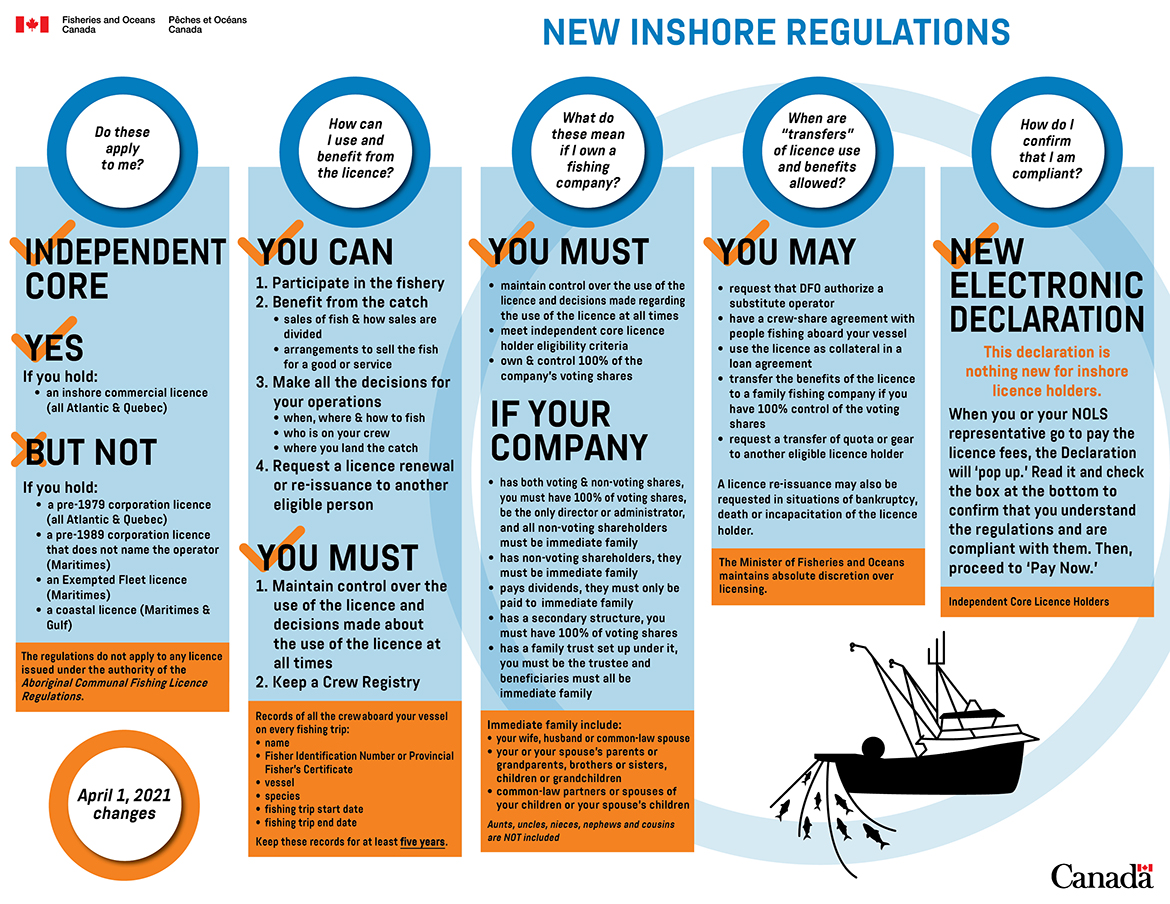Inshore regulations
Amendments made to the Fisheries Act in 2019 helped us put the suite of DFO policies for inshore and coastal fisheries in Atlantic Canada and Quebec into law. These changes have allowed us to keep the benefits of an inshore fishing licence in the hands of independent core harvesters and maintain a separation between the fishing sector and other sectors.
On this page
- What are inshore regulations?
- Do the eligibility criteria to hold an inshore licence apply to me?
- Guidance and other implementation information
- Operations and Enforcement
- Licence eligibility
- Review Process and Benchmarks
- Enforcement
- You can also contact us
What are inshore regulations?
When we strengthened authorities in the Fisheries Act in 2019, we also made regulatory amendments to our inshore regulations: the Atlantic Fishery Regulations, 1985 and the Maritime Provinces Fishery Regulations. These amendments clarified the rules governing inshore licences and created new enforceable requirements to help ensure licences remain in the hands of local, independent fish harvesters.
Part of the regulations came into force on December 9, 2020 when elements of the Owner-operator and Fleet Separation policies were added:
- Inshore and coastal licences can only be issued to:
- an eligible individual
- their estate or company in which they own and control 100% of the voting shares
- community-based fishing organizations
- Licence holders, named operators, or authorized substitute operators must personally fish the licence.
These rules are now law, rather than policy.
The December 2020 changes also enabled DFO to issue coastal licences to wholly owned companies, provided the eligible individual owns and controls 100% of the company’s shares.
The second part came into force April 1, 2021, adding criteria that prevents licence holders from transferring use or control of the licence.
When an inshore licence is issued, the holder can:
- Participate in the fishery
- Benefit from the catch
- sales of the fish
- how sales are shared with the crew
- Make decisions related to the fishing operations:
- where, when, and how to fish
- who is on the crew
- where the catch is landed
The licence holder may also:
- Participate in key decisions about the licence
- Request a renewal or re-issuance to another eligible person
- Request a substitute operator as per DFO policies
- Request quota or gear transfer to another eligible licence holder
Even if eligibility criteria are met, the Minister maintains absolute discretion over licensing.
Do the eligibility criteria to hold an inshore licence apply to me?
Yes, for Independent Core licence holders in Atlantic Canada and Quebec, except for holders of:
- Pre-1979 corporation licence
- Pre-1989 corporation licence (without operator named in Maritimes Region)
- Exempted fleet licence in Maritimes Region
- Coastal licence in Maritimes and Gulf Regions
These regulations do not apply to licences issued under the Aboriginal Communal Fishing Licence Regulations.
Will harvesters currently exempted/excepted from the inshore policies continue to be exempted under these regulations?
Yes. However, new exemptions or exceptions will not be allowed under the regulations.
Guidance and other implementation information
Implementation of these inshore regulation amendments affects many aspects of fishing an inshore licence, such as crew registry, fishing enterprise corporate structure, compliance declaration and allowable transfers.
For more information, see the following documents:
- Inshore regulations implementation: Agreements and stipulations (PDF, 898 KB)
- Inshore regulations implementation: Financial agreements (PDF, 960 KB)
- Inshore regulations implementation: Corporate structures (PDF, 1,111 KB)
- Inshore regulations implementation: Licensing process overview (PDF, 944 KB)
Operations and Enforcement
For nearly 10,000 inshore licence holders subject to the inshore regulations, eligibility and compliance is monitored through administrative processes and enforcement.
Licensing operations handle administration. Enforcement is the responsibility of Conservation and Protection (C&P).
Although DFO can suspend or cancel ineligible licences, administrative measures aim to help licence holders become compliant. When engagement and guidance don't lead to compliance, DFO can take enforcement action.
Licence eligibility
Eligibility is confirmed when a licence is issued. Licence holders must apply yearly via the National Online Licensing System (NOLS) and declare they meet all requirements before paying fees.
Review Process and Benchmarks
Reviews may occur at licence issuance, by random selection, or if there are concerns. Compliance is tracked through:
- Inshore questionnaires: Harvesters answer questions and submit documents.
- Request for additional information: Further clarification may be requested.
- Revised arrangements: Holders may adjust their situation to comply.
All licence holders reviewed to date were found eligible or made adjustments to comply. Data is updated every 6 months.
| Reporting period | Inshore questionnaires (1) | Request for additional information (2) | Revised Arrangements (3) |
|---|---|---|---|
| April 2021 - March 2022 | 1,174 | 342 | N/A |
| April 2022 - September 2022 | 550 | 281 | 37 |
| October 2022 - March 2023 | 507 | 238 | 55 |
| April 2023 - September 2023 | 458 | 198 | 43 |
| October 2023 - March 2024 | 526 | 264 | 52 |
| April 2024 - September 2024 | 447 | 275 | 35 |
| October 2024 - March 2025 | 446 | 252 | 37 |
| Totals | 4,108 | 1,850 | 259 |
Enforcement
Conservation and Protection (C&P) handles inspections and investigations. Fishery officers can take enforcement actions, including recommending prosecution.
Violations are prosecutable under the Fisheries Act and may result in penalties or licence suspensions/cancellations. Section 78 outlines penalties.
C&P gathers info from patrols, inspections, licensing groups, and public tips.
Report suspicious activity by contacting your nearest DFO office, calling Crime Stoppers (1-800-222-TIPS), or submitting a tip online.
You can also contact us:
Gulf Region
- GulfinfoGolfe@dfo-mpo.gc.ca
- Phone: 1-855-634-2355
Newfoundland and Labrador Region
Maritimes Region
Quebec Region
- Fishing-peche@dfo-mpo.gc.ca
- Phone: 1-877-535-7307
- Date modified:

